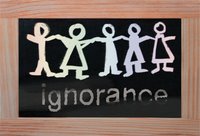There was a post by Steve about someone who had also left his previous church:
She said that in the weeks following this decision, she began to find out what her "supposed" church community was all about. Her choice to leave the church was met with mixed reviews, with some people being downright offended. People from her small group that called her on a regular basis stopped calling. People she would call suddenly were too busy to get together. And, in the midst of her personal needs, when she really needed some of these "tried and true" friends, they were nowhere to be found. While she had served this church and loved the people there for years, she felt a mixed bag of sadness and rage at the way she was now being treated.Continue reading First Church of the Ambivalent.
This lady told me today that it has been in the midst of her crisis that she has discovered what it truly means to be supported and loved by those that genuinely care for her. With some reservation and dismay, she told me that she has found that love and support more consistently from those outside the walls of the church. Many times she has felt like saying a big "F-You" to the church, but has found a safe place to attend, that is allowing her to heal and be restored physically, spiritually and emotionally.
Wow, could I sure relate to that.
What I found so amazing when I'd leave a church, is just how little the people there actually cared about me outside of those four walls. Or maybe they did care, but they didn't know how to translate that caring into a relationship that didn't involve church.
Sometimes I think a lot of us may have approached church in an unhealthy way, looking for it to meet more needs than it can reasonably meet. On the other hand, I feel like that's exactly what many churches promote. Or, like a few pastors and church members I'd run into, they were in love with the idea of being needed and wanted, but didn't like the practical applications of that.
Of course I also rationalized for them that with me there were extenuating circumstances. I was ex-gay, I had "issues," all of that. I had come to believe that perhaps people got into more of a "helping" one-sided relationship with me than they would with others they considered peers. I used to think that all these relationships that didn't work--all these people who didn't want to be my friend when our friendship didn't include going to the same church--didn't work because of me, really. But in reading Stupid Church People, I realize maybe I'm not so special. Maybe there's something about church relationships (in Evangelical circles, at least) that aren't like other relationship.
I'm still not clear on what it is, but here's what I posted in response to Steve's post:
The last few years of my life have been a journey in trying to learn what real relationships are with real people who want to be in my life, not because they feel like they should (which is what the church often fosters) but because they want to.Yeah, maybe jilted lover is a good way of describing some of us ex-church-goers. I don't know. I suppose I don't feel as much jilted as I feel relief for having escaped what had been to me some very toxic environments and empty friendships. I'm still trying to sort it all out. At least I know I'm not alone on that journey.
The flip side of that is not being able to trust people as easily as I think I used to. When I left different churches and found out how superficial the relationships truly were (I actually found it odd that church relationships seemed more superficial than work ones...I'm still friends with many former co-workers, and not hardly with any former church-goers, to whom I would have said at the time I was much closer), I realized I didn't know what it was to trust that someone wanted a realationship with me just because of who I was.
Even now, I find myself asking and questioning why someone would want to be friends with me. What do they want? What are they getting out of it? What is the thing that ties us together that would render the friendship meaningless and "old" were it to disappear (like going to the same church).
I think churches foster a strange kind of intimacy that isn't real, maybe. Or maybe it's based on the wrong things from the get-go.
All in all, I really truly have felt the best in my life not belonging to any kind of church. I still can't ever imagine wanting to go back to one. I almost felt like my real life began when I walked away from church at the end of 2002.



















